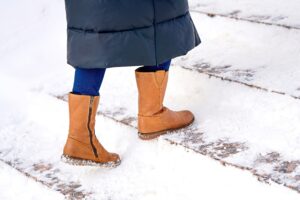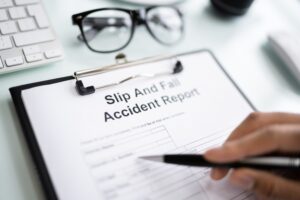Slip and fall accidents are among the most common injury accidents that occur nationwide. While these types of accidents can happen due to various circumstances at virtually any time, environments where ice and snow are common often increase the chances of a slip and fall incident.
When slip and fall accidents happen on ice and snow, questions may arise regarding who is liable for such an incident and how an injured party should go about seeking compensation.
If you have suffered an injury in a slip and fall accident that happened on ice or snow, an experienced slip and fall accident lawyer in Snohomish can help you take the appropriate steps to identify the responsible party and hold them accountable for the harm you have endured.
A skilled attorney who is well-versed in personal injury law, the specific laws and statutes of your state, and experience in handling slip and fall accident cases can work with you to pursue the results you need as you look to recover from your accident — physically and financially.
Contact a knowledgeable slip and fall accident lawyer today for your free consultation.
Understanding Slip and Fall Accidents on Ice and Snow
Slip and fall accidents encompass a wide variety of injury incidents that occur due to negligence or hazardous conditions. Environments that are heavily affected by ice and snow are among some of the most frequent locations for slip and fall accidents due to slick surfaces and unsure footing.
Slip and fall accidents related to ice and snow can happen on sidewalks, driveways, parking lots, and other areas where ice and snow accumulate during winter. Freezing temperatures can keep outdoor surfaces slippery, creating circumstances ripe for slips and falls.
In accidents where people slip and suffer an injury, it is critical to determine who was responsible for maintaining the premises. Your lawyer will have the necessary insight into all applicable statutes to analyze the details of your accident and determine the best course of action moving forward.
Common Slip and Fall Scenarios

As mentioned above, slip and fall accidents are some of the more common sources of personal injury claims. It is due to the wide range of circumstances that can result in slip and fall accidents. Though slip and fall accidents can happen in various environments, settings in which ice and snow are common make such accidents even more likely.
Some of the most common scenarios in which a slip and fall accident in ice or snow can occur include:
- Sidewalks: Ice and snow buildup on public walkways can be prime locations for slips and falls.
- Parking Lots: In winter, unsalted or uncleared areas of parking lots can leave hazardous icy patches.
- Stairways: Outdoor steps like those at apartment complexes can be hazardous for footing.
- Driveways: Residential and commercial driveways can present risks to homeowners, visitors, and customers.
- Entrances: Any doorway leading into a building from outdoors can be a prime location for snow, ice, and slick footing.
Any of the scenarios above can be hazardous and result in unsure footing, slips, and falls. Knowing such situations can prevent potential injury or help you and your attorney strategize following an accident.
General Principles of Premises Liability
Slip and fall accidents fall under a category of the law known as premises liability. Premises liability is a legal concept under which injured people can hold owners or occupiers of a property responsible for maintaining a reasonable level of safety.
The basic foundation of premises liability is that the owners or individuals responsible for maintaining the property owe a legal duty of care to visitors, which includes performing repairs and addressing potential hazards such as ice and snow.
If the party responsible for upholding this duty of care fails to do so, and another party suffers an injury due to a preventable accident, the owner or occupier can be held legally accountable.
You need a lawyer familiar with premises liability claims and how this principle pertains to slip and fall accidents to take legal action.
Premises Liability & Slip and Fall Accidents
Premises liability law plays a significant role in slip and fall accidents related to ice and snow and the process for determining who is liable for any injuries suffered.
As mentioned above, property owners bear a legal responsibility to ensure the safety of anyone who comes onto the property — which includes addressing any hazards presented by ice and snow accumulation on the property, particularly in high-traffic areas.
Neglecting this responsibility — by failing to clear pathways, apply salt to ice patches, or post warnings to visitors — leaves the property owner legally liable for slip and fall accidents.
Proving the property owner’s negligence requires a lawyer who understands different types of visitor designations and how they relate to premises liability law.
Property Visitor Distinctions
In slip and fall accidents, like other premises liability matters, the legal duty of care the property owner bears for visitors can be influenced by the visitor’s legal designation.
These designations function to determine the level of responsibility carried by the property owner and can affect the outcome of slip and fall claims.
The primary categories of property visitor designations include:
- Invitees: Individuals invited onto the property by the owner to conduct business, such as customers at a store.
- Licensees: Visitors on the property for social (non-business) purposes, such as family members or friends at someone’s house.
- Trespassers: Individuals who come onto the property without the owner’s permission.
A lawyer will know the designations listed above and how each affects a slip and fall accident case.
Liability of Property Owners
Snow and ice are among the potential hazards property owners are responsible for addressing to ensure the safety of visitors. However, the extent of a property owner’s liability can vary depending on the property type and the relationship between the owner and visitor.

Whether the property is a private home, a commercial property, or a rental property owned by a landlord, each scenario has unique aspects when it comes to properly maintaining the property.
When a visitor to a property slips and falls on ice or snow and suffers an injury, the investigation will immediately turn to the property owner or the individual responsible for maintaining it. The outcome of this investigation will depend greatly on the intended use of the property and why the visitor was there.
Residential Property
Homeowners bear a legal duty of care to maintain a reasonable level of safety for visitors, including during winter when snow and ice can create hazardous conditions.
Clearing driveways and sidewalks, applying salt or sand to slick surfaces, and other winter weather maintenance are included in this responsibility. While the specifics of the homeowner’s liability may vary depending on the local ordinances of the jurisdiction, failing to take proper steps to maintain the property can leave the homeowner legally vulnerable.
Determining whether or not the homeowner knew about the hazardous conditions and had time to address them will play a significant role in determining the level of liability in a slip and fall accident.
Commercial Property
Business owners and property managers have an increased responsibility to provide a safe and secure environment to visitors, including customers and employees.
Addressing ice and snow hazards promptly in parking lots, walkways, and entrances is necessary. Failing to uphold a reasonable standard of maintenance can lead directly to slip and fall accidents, injuries, and subsequent lawsuits.
The law holds businesses to a higher standard when it comes to performing property inspections, removing snow, applying sand or salt to icy areas, and clearly labeling hazardous locations when necessary.
Determining liability on the business owner’s part often depends on whether the business took all appropriate steps to address any hazardous conditions that played a significant role in an accident that resulted in a visitor’s injury.
Landlords and Tenants
When a slip and fall accident related to ice and snow occurs on a rental property, the specifics of the lease agreement signed by both parties can often play a significant role in liability.
Generally, landlords are at least partially responsible for maintaining the rental property’s common areas, such as sidewalks, stairways, and parking lots.
Conversely, tenants may be responsible for maintaining porches or driveways. If a landlord fails to uphold their duty of care, you may hold them legally liable for injuries that result from a slip and fall accident.
Understanding the specifics of the laws in the jurisdiction and the rental agreement can shed more light on liability in the event of an accident.
Municipal Liability
There are cases in which municipalities can be held liable for slip and fall cases resulting from ice and snow. Public property — including government-owned buildings — also needs to be properly maintained during winter months to prevent ice and snow accumulation on sidewalks, driveways, parking lots, and entryways.
If the injured party can prove that the governing municipality knew about the hazardous conditions, had time to address them, and failed to do so, a solid legal claim can be made against the responsible agency or institution.
Proving Liability in Slip and Fall Cases

As with other premises liability cases, proving liability in a slip and fall case requires the injured party to demonstrate the responsible party’s negligence in maintaining a safe environment.
Establishing liability includes several key elements, including:
- The responsible party owed the injured party a legal duty of care.
- The responsible party breached this duty of care by failing to maintain the property.
- This failure to maintain safe conditions directly caused the injury.
- The injury resulted in actual damages.
Photos, medical records, witness statements, and expert testimony can all be helpful evidence to support the injured party’s claim.
The Importance of Legal Representation
Legal matters are complex, and slip and fall accident cases are no different. Having experienced legal representation working on your behalf is vital to your chances of obtaining the compensation you deserve.
A knowledgeable personal injury lawyer can help with:
- Assessing Liability: Determining who was responsible for your accident.
- Negotiating: With insurance companies and/or legal representation for the other party.
- Filing Legal Documentation: Ensuring all paperwork and forms are filed accurately.
- Aggressive Advocacy: Seeking to maximize compensation and protect your rights.
With an attorney skilled in slip and fall accident cases on your side, you can improve your chances of reaching the type of outcome you need.
With their extensive knowledge of personal injury law and years of experience in handling similar cases, a skilled attorney will carefully evaluate the circumstances surrounding your case, gathering evidence and witness testimonies to support your claim.
Contact an Experienced Slip and Fall Accident Lawyer Today
Injuries in any accident can cause stress and challenges in multiple areas of your life. From the physical pain and recovery to the financial burden resulting from medical bills and lost income, the list of problems resulting from such an accident can be long.
Knowing who you can hold liable for the accident and how to go about seeking to hold that party accountable is a good place to start when you want to reach a fair resolution to your situation.

Strong and reliable legal counsel can make a big difference when you are looking for answers and guidance following a slip and fall accident on ice or snow.
Working with a knowledgeable slip and fall accident lawyer gives you peace of mind that your case is in capable hands and confidence that your rights and best interests will remain priorities throughout the process.
If you have suffered an injury due to the negligence of another party in a slip and fall accident, now is the time to take action to seek fair compensation.
A successful claim can result in an awarded amount that can pay your medical bills, cover the income you lost due to being unable to work, and ease the burden you have been carrying.
Reach out to a personal injury attorney in Snohomish today to discuss your case and learn more about your options. Don’t face this challenge alone, call today.